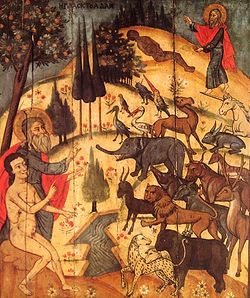SOURCE: The Sun-News
By Fr. Gabriel Rochelle
 |
But what is that beauty? Not simply art, no matter how well executed or in what medium. Indeed, we can become tearful at the sight of graceful dancers or upon hearing a brilliant pianist play Chopin, and we know intuitively that there is something generically spiritual going on. But surely Dostoevsky could not have meant that the world is saved, redeemed, made holy, brought to fulfillment by the sheer invention or discovery of beauty. Something more must have been on his mind and heart.
Perhaps Dostoevsky meant that we must intend beauty in everything that we do, that our hearts and minds are uplifted and brought into a sphere of grace when and as we seek beauty in our actions and by our words. Surely the reader in me knows when a felicitous phrase captures my imagination and the words of a good writer enable me to see things beautifully.
This links to the ancient notion of "calling," that we are invoked at the core of our being to come forth in conviction and commitment in everything that we do. At the heart of this is the idea of doing things as well as we can. Bishop Gerasimos of blessed memory, one of the bishops of an American Orthodox Church, told a seminarian fretting over his vocation, "Do whatever you like, do whatever comes your way, but do it well as a Christian. Whatever you choose, do it for the love of God and the service of others."
Friend Demetrios Katos, Orthodox theologian at Fordham, says it well: our calling "founded on the belief that we are in the image of God engenders persistence in the search for the optimal role to play in life." The key word is optimal; the best role we play In life is simultaneously the beautiful role, because as we know intuitively, beauty and goodness are related, and in Greek, the same adjective means both.
Then again, maybe Demetri's key word is persistence. We must be tenacious and longsuffering because it is difficult to express beauty. We are called to more than a job; our call is to the creation of beauty in our little corner of the world and it's hard.
We may create beauty in any sort of work, indeed even — and perhaps especially — through so-called "menial labor." Once I was in England and observed a street sweeper who obviously not only took pleasure in his work, but he did it with the meticulous attention that a painter would bring to creating a masterpiece. It was a joy to watch him sweep.
Four decades later, the mental image remains sharp and clear.
Finally, Demetri's key word may be "image of God.'" St Gregory of Nyssa, my go-to theologian of beauty, said: "You alone are an icon of eternal beauty, and if you look at your Creator, you will become what he is, imitating him who shines within you, whose glory is reflected in your purity."
The fulfillment of the world is in Christ who is the ultimate image of the beauty of God. This we see as Christians, and I dare say Orthodox Christianity has captured this at a deep level in worship and music and in the beautification of our churches. But the calling to beauty is for all Christians, indeed for all people no matter what their faith or lack thereof. We all know instinctively when we have done something that has value, we know that that thing is beautiful and good and, even if it is not everlasting, it brings a sense of fulfillment in the moment.
